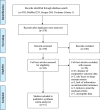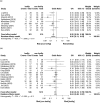Antimicrobial resistance in hypermucoviscous and non-hypermucoviscous Klebsiella pneumoniae: a systematic review and meta-analysis
- PMID: 39629681
- PMCID: PMC11650459
- DOI: 10.1080/22221751.2024.2438657
Antimicrobial resistance in hypermucoviscous and non-hypermucoviscous Klebsiella pneumoniae: a systematic review and meta-analysis
Abstract
Antimicrobial resistance has recently increased due to emerging carbapenem-resistant Klebsiella pneumoniae and extended-spectrum β-lactamase (ESBL)-producing strains of K. pneumoniae, especially among hypermucoviscous K. pneumoniae (hmKp) strains. To evaluate the prevalence of ESBL-producing and carbapenem-resistant strains in hmKp and non-hmKp clinical isolates through a systematic review and meta-analysis. We searched PubMed, Scopus, and Cochrane Library databases from January 2000 to June 2023. Clinical and in vivo/in vitro studies involving confirmed K. pneumoniae clinical isolates differentiated into hmKP and non-hmKP strains based on string test results. Odds ratios (ORs) and 95% confidence intervals (CIs) were calculated based on the number of individuals in each target group. Forest plots were used to visualize the effect sizes and 95% CIs of individual studies estimated using the inverse variance and DerSimonian - Laird methods with fixed - and random-effects models, respectively. Heterogeneity was assessed using Cochran's Q test (I2 ≥ 50%). Fifteen studies comprising 2049 clinical isolates of K. pneumoniae met the inclusion criteria. Meta-analysis revealed that hmKp strains were associated with a significantly lower prevalence of ESBL-producing strains (pooled OR: 0.26, 95% CI: 0.11-0.63, P = 0.003) and a slightly lower prevalence of carbapenem-resistant strains than non-hmKp strains (pooled OR: 0.63, 95% CI: 0.40-0.97, P = 0.038). hmKp strains exhibited lower and slightly lower prevalence of ESBL production and carbapenem resistance, respectively, than non-hmKp strains. However, given the rising prevalence of ESBL-producing and carbapenem-resistant hmKp strains, patients infected by string-test-positive K. pneumoniae must be managed prudently, considering the potential for highly resistant strains.
Keywords: Klebsiella pneumoniae; antimicrobial resistance; carbapenem-resistant; extended-spectrum beta-lactamase; hypermucoviscous.
Conflict of interest statement
No potential conflict of interest was reported by the author(s).
Figures



References
-
- Liu C, Guo J.. Hypervirulent Klebsiella pneumoniae (hypermucoviscous and aerobactin positive) infection over 6 years in the elderly in China: antimicrobial resistance patterns, molecular epidemiology and risk factor. Ann Clin Microbiol Antimicrob. 2019;18:4. doi: 10.1186/s12941-018-0302-9 - DOI - PMC - PubMed
-
- Tanimoto H, Shigemura K, Osawa K, et al. Comparative genetic analysis of the antimicrobial susceptibilities and virulence of hypermucoviscous and non-hypermucoviscous ESBL-producing Klebsiella pneumoniae in Japan. J Microbiol Immunol Infect. 2023;56:93–103. doi: 10.1016/j.jmii.2022.08.010 - DOI - PubMed
Publication types
MeSH terms
Substances
LinkOut - more resources
Full Text Sources
Medical
Miscellaneous
